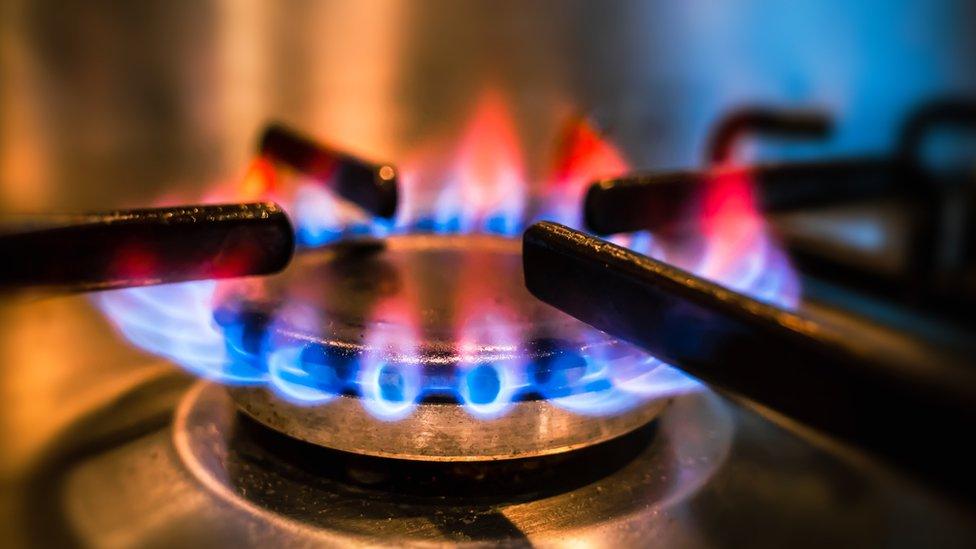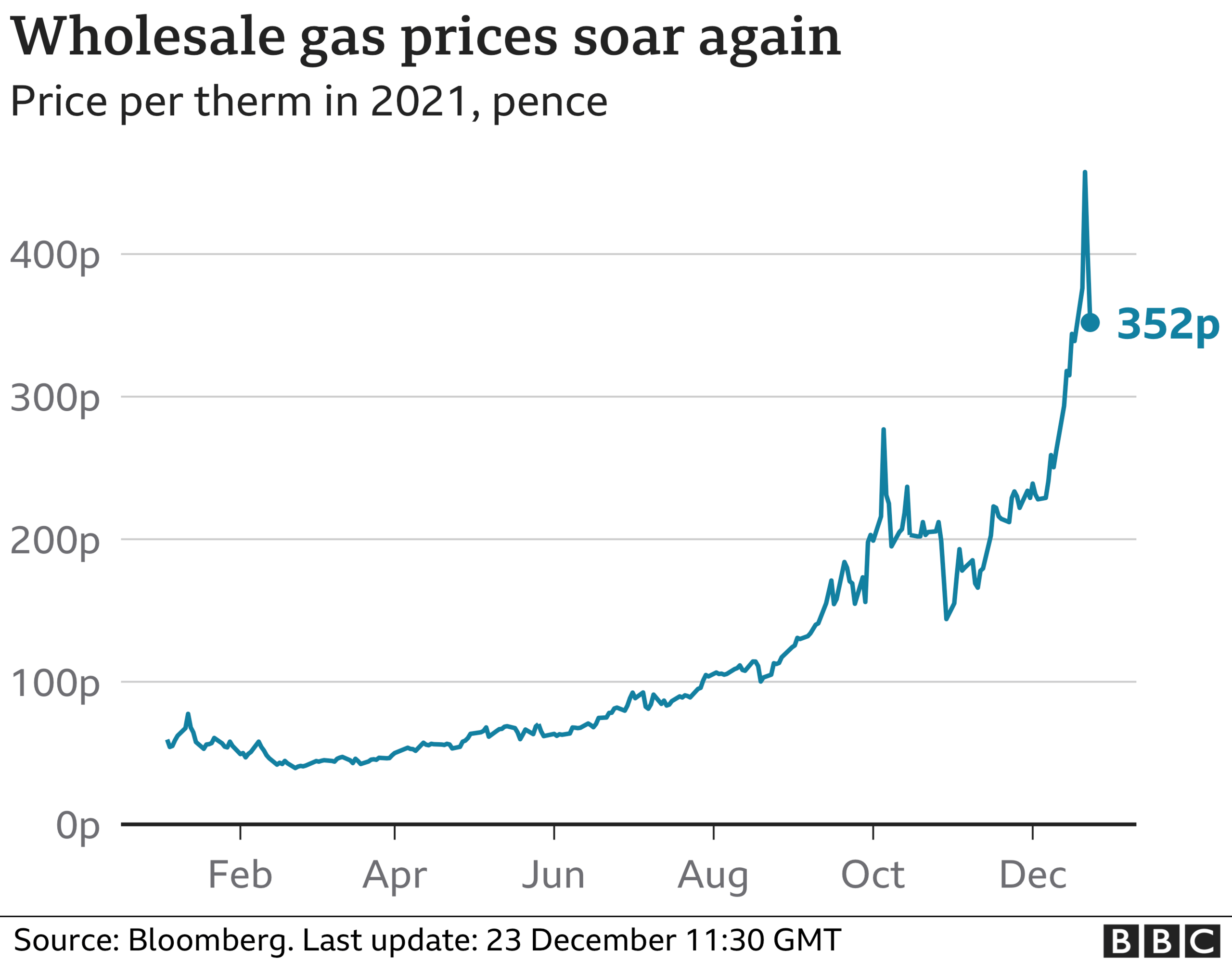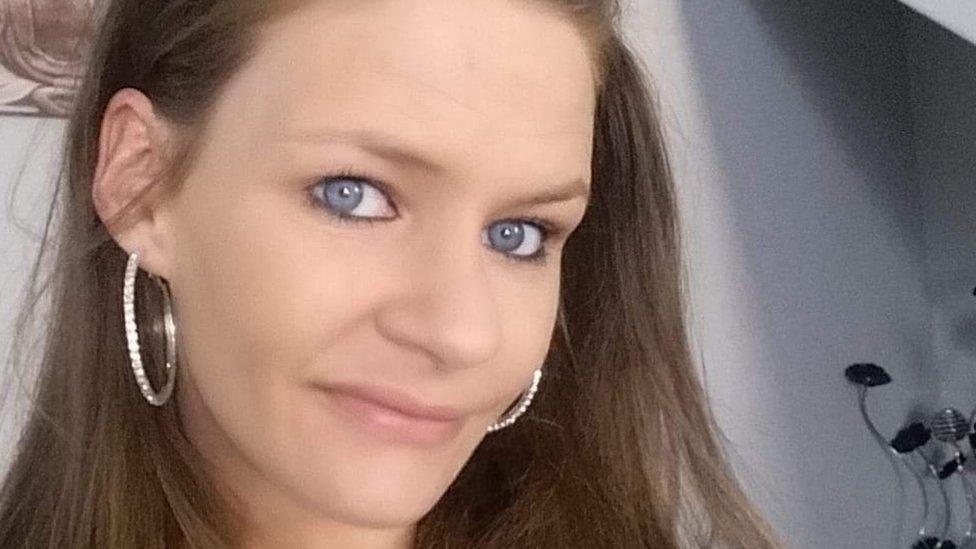Energy prices: Government must show more urgency, says Ovo boss
- Published

The government is showing "nowhere near enough urgency" in finding a solution to steep increases in gas and electricity prices, one energy boss has told the BBC.
Ovo's boss Stephen Fitzpatrick predicts the rise in wholesale gas prices and its impact on people will be "an enormous crisis for 2022".
The business secretary met with Ofgem and energy firms on Monday.
The government says it wants to make sure households are protected.
A spokeswoman for the Department for Business, Energy and Industrial Strategy said the meeting was "to discuss the ongoing effects of record high global gas prices on the sector".
"Throughout the meeting there was discussion of the issues facing the sector and an agreement for meetings to continue over the coming days and weeks to ensure UK consumers are protected," she said.
It is understood that representatives from the Treasury and Number 10 were also present.
Mr Fitzpatrick, who attended the virtual meeting, said his priority was for the government and the regulator to understand how critical the situation is.
He said the main worry was how consumers would be supported through price increases.
"We've seen this energy crisis unfold now for the last three months and we've watched as energy prices have spiked, fallen back, and spiked again," he said.
"We've had more than 30 bankruptcies in the sector, we've had millions of customers forced to change supplier.
"The cost to the consumer has already been more than £4bn. We haven't seen any action from the government or from the regulator. There's an acceptance that there's a problem, but nowhere near enough urgency to find a solution," he added.
He pointed to the example of some European governments that have helped consumers in their countries.
In recent months, wholesale gas prices have risen to unprecedented levels. Last week, they hit a new record of 450p per therm, which experts think could take average annual gas bills to about £2,000 next year.
On Thursday, Energy UK, the industry's trade body, warned bills could soar by another 50% unless the government intervened.


The meeting between Business Secretary Kwasi Kwarteng and the energy industry has taken place at a time when the sector is facing an unprecedented situation.
The prices paid by suppliers for the gas and electricity they sell on to consumers have risen dramatically in recent weeks. Because household bills are capped by the regulator Ofgem, they have been unable to pass the extra costs to their customers immediately, and dozens have gone out of business.
Nor are consumers themselves immune. The price cap is due to be raised in the spring, and very steep increases are expected.
Against this background, energy firms have been demanding radical action, such as cuts in taxes and environmental levies to bring down bills for vulnerable consumers, as well as changes to the way in which the price cap itself operates.
Against this background, today's meeting is likely to be one of many over the coming days and weeks.

Mr Fitzpatrick said: "It is already households' largest single bill to pay and it is going to double that. And I think expecting consumers to shoulder that kind of volatility without any kind of support from government is just unrealistic."
More than 20 energy companies have collapsed since wholesale prices started to spike, unable to pay high prices or pass the increased cost on to consumers. Nearly four million customers have been affected.
Consumers are protected from big rises in wholesale costs by a price cap set by the regulator Ofgem. However, the cap is due to change in April.
Mr Fitzpatrick said it was important "we don't waste any more time" addressing the rising cost of household energy.
"It is a really good sign of just how urgent everything is that we're meeting between Christmas and New Year to work this out," he said. "But we really have to take the opportunity today."

Labour has urged the government to use the money raised through higher than expected VAT receipts, external, driven by the higher cost of food and energy prices, to cut household energy bills.
Shadow chancellor Rachel Reeves said Labour wanted the government to immediately announce the removal of VAT from household heating bills over winter.
"We need a sustainable and ambitious approach to energy," she said.
Mr Fitzpatrick also suggested the government could consider "taking away some of the environmental social policy costs that we have seen increase over the years and it may mean that we need some kind of price smoothing mechanism from the government".
"These are all things that we are going to be discussing today," he said.
The government said: "We regularly engage with the energy industry and will continue to ensure that consumers are protected through the Energy Price Cap, which is insulating millions from record global gas prices."

A VERY BRITISH SCANDAL: One of the most notorious and brutal legal cases of the 20th century
A STUNNING WINTER WALK: Shepherdess Amanda Owen takes us through the Yorkshire Dales

Related topics
- Published15 December 2021

- Published2 December 2021

